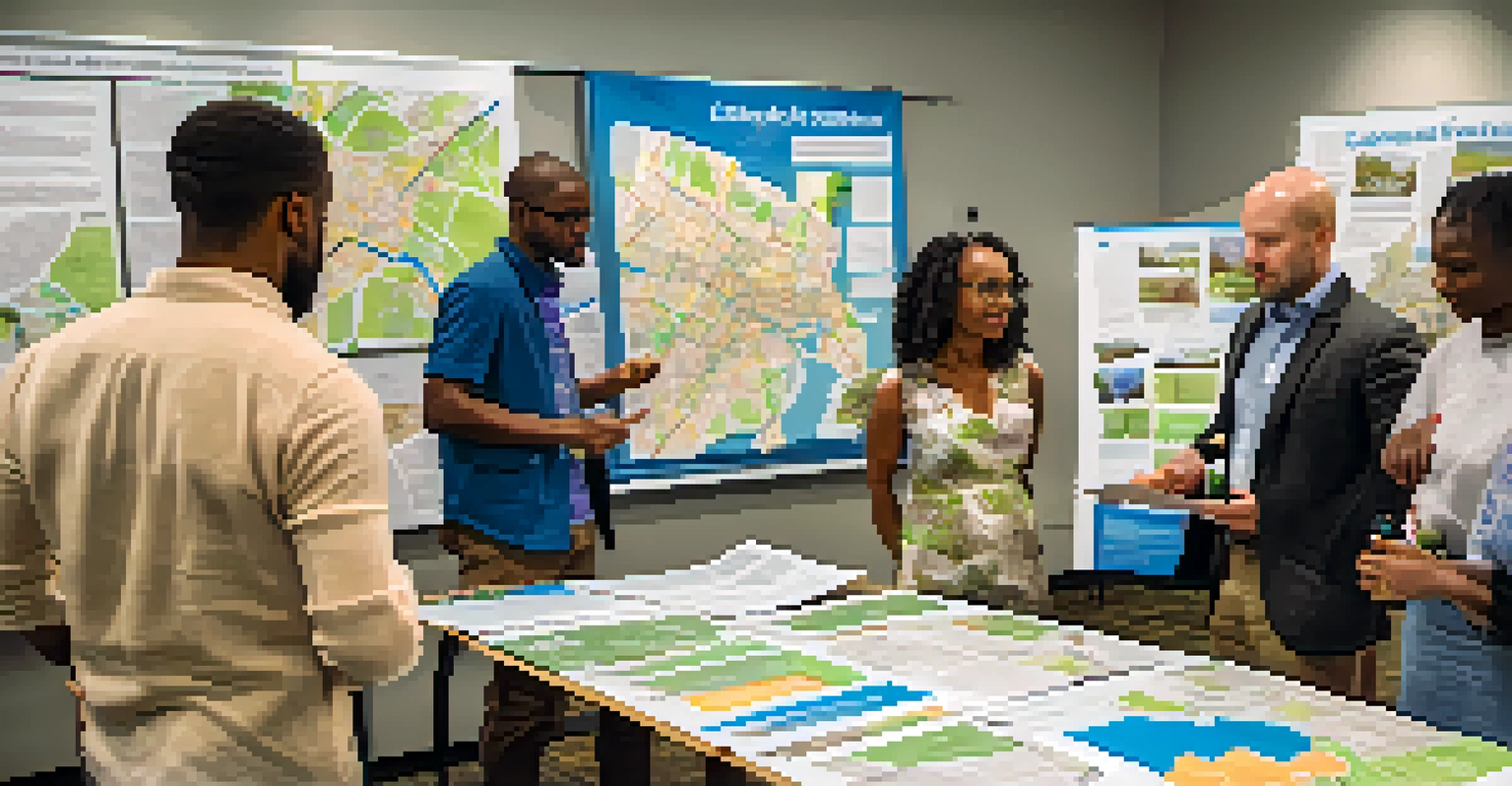Sustainable Transportation Initiatives in Charlotte

Understanding Sustainable Transportation in Charlotte
Sustainable transportation refers to modes of travel that minimize environmental impact while maximizing efficiency. In Charlotte, this concept is gaining momentum as the city seeks to reduce its carbon footprint and improve the quality of life for residents. The focus is on creating a balance between mobility, economic growth, and environmental stewardship.
Sustainable transportation is not just about reducing emissions; it's about enhancing the quality of life for our communities.
Charlotte is implementing various initiatives to promote sustainable transportation, such as expanding public transit options and enhancing walking and biking infrastructure. These efforts not only ease traffic congestion but also encourage healthier lifestyles among residents. By making sustainable transportation accessible, Charlotte aims to foster a community that values eco-friendly practices.
The city is actively engaging with residents to understand their transportation needs and preferences. By gathering feedback, Charlotte can tailor its initiatives to create a more efficient and user-friendly transportation system, ensuring that sustainability becomes a shared community goal.
Public Transit Enhancements: The CATS Initiative
Charlotte Area Transit System (CATS) is at the forefront of the city's public transport initiatives. By expanding bus routes and introducing light rail services, CATS aims to provide reliable, efficient, and eco-friendly travel options. The goal is to make public transit a viable alternative to driving, reducing the number of vehicles on the road.

In addition to expanding routes, CATS is investing in electric buses that not only cut down on emissions but also lower operating costs. This transition to electric vehicles demonstrates Charlotte's commitment to green technology and sustainable urban planning. The city is actively promoting these improvements to encourage more residents to use public transit.
Charlotte's Eco-Friendly Transit Push
The city is enhancing public transit options and infrastructure to promote sustainable transportation and reduce its carbon footprint.
With increased investment in public transit, the city is seeing a gradual shift in commuter behavior. More residents are choosing public transportation, which is essential in the fight against climate change. As Charlotte continues to enhance its transit system, it sets an example for other cities aiming for sustainability.
Biking and Walking Initiatives for a Greener City
Charlotte is not just focusing on public transit; it's also committed to making the city more bike- and pedestrian-friendly. The development of dedicated bike lanes and pedestrian paths encourages residents to opt for cycling and walking as daily transportation methods. This not only reduces vehicle emissions but also promotes a healthier lifestyle.
The future of transportation is not just about cars; it's about creating integrated systems that connect people to their communities.
The city has launched several programs to support biking, including bike-sharing initiatives and community events that promote cycling. These efforts aim to cultivate a culture of biking among residents, making it a fun and accessible way to navigate the city. By prioritizing these initiatives, Charlotte is fostering a sense of community and encouraging active living.
Furthermore, the integration of biking and walking paths into urban planning ensures that these options are safe and convenient. As more residents embrace these modes of transportation, Charlotte moves closer to its goal of becoming a sustainable city. The benefits of biking and walking extend beyond transportation; they also enhance social interactions and community engagement.
Electric Vehicles: Charging Ahead in Charlotte
The rise of electric vehicles (EVs) is a key component of Charlotte's sustainable transportation strategy. With an increasing number of people opting for EVs, the city is investing in charging infrastructure to support this growing trend. By making it easier to charge electric vehicles, Charlotte is encouraging residents to make the switch from traditional gas-powered cars.
In addition to public charging stations, there are incentives for residents to purchase electric vehicles, such as rebates and tax credits. These initiatives aim to alleviate concerns about the initial costs of EVs and promote their adoption. Charlotte recognizes that supporting EVs is crucial for reducing greenhouse gas emissions and improving air quality.
Biking and Walking for Healthier Living
Charlotte's development of bike lanes and pedestrian paths encourages residents to adopt healthier, eco-friendly commuting methods.
As the city continues to expand its network of charging stations, it is also launching educational campaigns to inform residents about the benefits of electric vehicles. By fostering awareness and accessibility, Charlotte is paving the way for a cleaner future. The shift towards electric vehicles not only contributes to sustainability but also positions Charlotte as a leader in green transportation.
Innovative Mobility Solutions: Car-Sharing and Beyond
Car-sharing programs are gaining traction in Charlotte as a flexible and sustainable alternative to car ownership. These services allow residents to rent vehicles on an as-needed basis, reducing the number of cars on the road. Such initiatives are particularly appealing in urban areas where parking can be a challenge, providing an efficient solution for occasional drivers.
Additionally, ride-sharing apps are becoming increasingly popular in Charlotte, offering residents a convenient way to get around without owning a vehicle. By promoting these options, the city is working to decrease traffic congestion and lower emissions. Car-sharing and ride-sharing not only simplify transportation but also encourage residents to rethink their reliance on personal vehicles.
Charlotte's commitment to innovative mobility solutions reflects its goal of creating a more sustainable transportation landscape. These programs complement public transit and active transportation, providing a comprehensive approach to urban mobility. As more residents embrace these options, Charlotte is taking significant strides toward a greener future.
Community Engagement: Building a Sustainable Future Together
Community engagement plays a vital role in Charlotte's sustainable transportation initiatives. The city actively seeks input from residents, businesses, and organizations to shape transportation policies and programs. By fostering open dialogue, Charlotte ensures that its initiatives align with the needs and preferences of the community.
Regular workshops, surveys, and public forums provide platforms for residents to voice their opinions on transportation issues. This collaborative approach not only empowers citizens but also fosters a sense of ownership over the city's transportation future. By involving the community in decision-making, Charlotte is building a transportation system that reflects its unique character and values.
Community Involvement in Transport Plans
Active community engagement helps shape Charlotte's transportation initiatives, ensuring they reflect residents' needs and preferences.
Through these engagement efforts, the city can identify barriers to sustainable transportation and develop targeted solutions. As residents become more involved, they are likely to adopt sustainable practices in their daily lives. Charlotte's commitment to community engagement is not just about transportation; it's about creating a thriving, interconnected community.
Future Goals: Vision for Sustainable Transportation
Charlotte's vision for sustainable transportation goes beyond current initiatives; it aims for continuous improvement and innovation. The city has set ambitious goals, such as reducing vehicle emissions by a specific percentage over the next decade. This commitment reflects Charlotte's dedication to addressing climate change and promoting a healthier environment.
Future plans include further expanding public transit options, enhancing bike and pedestrian infrastructure, and investing in emerging technologies. The city is exploring partnerships with private companies to develop smart transportation solutions that optimize traffic flow and reduce congestion. These forward-thinking strategies position Charlotte as a model for sustainable urban development.

As Charlotte moves toward its sustainable transportation goals, it emphasizes the importance of collaboration among various stakeholders. By working together—government, businesses, and residents—the city can create a transportation system that is not only efficient but also equitable. The future of transportation in Charlotte is bright, driven by a community committed to sustainability.
Celebrating Success: Recognizing Sustainable Transportation Efforts
As Charlotte continues its journey toward sustainable transportation, it's important to celebrate the successes achieved thus far. Recognition of these efforts can inspire further progress and motivate residents to engage in sustainable practices. Events that highlight transportation accomplishments foster community pride and awareness.
The city often hosts workshops and fairs where residents can learn about sustainable transportation options and share their experiences. These events not only educate the public but also create a sense of community around shared goals. By showcasing local success stories, Charlotte encourages others to participate in sustainability initiatives.
Celebrating achievements also helps to reinforce the importance of sustainable transportation in everyday life. As the community comes together to support these initiatives, it strengthens the collective commitment to creating a greener Charlotte. The journey towards sustainability is ongoing, and each success story contributes to a brighter future for the city.